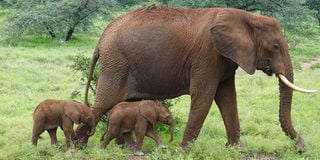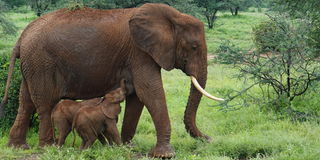Premium
Mother elephant gives birth to twins in Samburu National Reserve

Mother elephant by the name Alto with her female twin calves at Samburu National Reserve.
What you need to know:
- The organisation said the discovery was made by researchers based in Samburu National Reserve.
- Elephants usually give birth to only one calf at a time, although on rare occasions they give birth to twins.
An elephant in Samburu National Reserve has given birth to twin calves, research and protection organisation Save the Elephants announced on Friday.
The mother elephant and her twin calves - both female - were spotted at the National Reserve a few days ago.
This is the second set of elephant twin calves that have been born in Samburu National Reserve within a span of 23 months.
According to Save the Elephants, the mother elephant, christened Alto, comes from a family of elephants known as Clouds.
"Almost two years after Bora from the Winds family gave birth to twins for the first time in decades, Alto from the Clouds has astonished us with her own set of twins," Save the Elephants said in a statement.
"Her two adorable female calves, estimated to be just days old, were first spotted by our researchers in Samburu National Reserve this week," the statement further reads.
The birth of the twin calves has come as a pleasant surprise to Save the Elephants which is mandated with monitoring elephants in Samburu National Reserve.
The organisation said the discovery was made by researchers based in Samburu National Reserve.

Mother elephant by the name Alto with her female twin calves at Samburu National Reserve.
The birth of the twin elephants comes barely two years after another mother elephant by the name Bora gave birth to twin calves - male and female - although the female calf died during the drought last year.
"Bora’s twins were born during one of the worst droughts, but despite her excellent mothering skills, the female twin sadly died," Save the Elephants said.
Elephants usually give birth to only one calf at a time, although on rare occasions they give birth to twins.
"Twins are rarely encountered in elephant populations, and form around only one per cent of births," said Save the Elephants.
"Elephant twins rarely survive in the wild but we are optimistic about Alto’s twins as there is plenty of food in the park following the rains. Alto should be able to produce plenty of milk to feed her calves plus she also has the amazing support of her herd," Save the Elephants said.
The organisation said researchers they will keep monitoring the health and progress of the calves.
The gestation period for an African elephant is 22 months, while that of Asian elephants ranges between 18 and 22 months. This is the longest gestation period among mammals.
According to researchers, while elephants can live for up to 70 years, a mother elephant will typically have a maximum of four or five calves in its lifetime.




